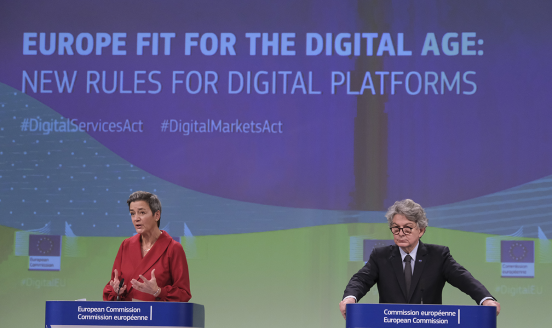Samsung, Google-Motorola ruling: stepping out of the patent abuse saga?
The Commission, in its role as regulator, should mandate standard-setting organisations to define the details of FRAND ‘contracts’ compatible with EU
European Commission investigations into alleged patent abuse in standard-setting cases have typically generated much heat but little light. The Hynix and Infineon complaint against chip maker Rambus, lodged way back in 2002, the complaint by Ericsson and others against Qualcomm for unfair pricing, the complaint by Nokia against IPCom – all were complex, time-consuming and resource intensive, but provided little or no guidance on the Commission’s approach to this type of antitrust abuse.
However, new Commission decisions on Google-Motorola and Samsung bring some clarity, though not in the way that some hoped. Rather than indicating the fair price for accessing a standardised technology, the Commission’s decisions in effect imply that it should be a question for the national courts so that the fairness of licensing contracts will ultimately be determined by judges. This is welcome. Because disputes about the licensing price of patents are normally of a commercial nature, it seems obvious that such disputes should be resolved by judges.
There is however a contradiction in the proposed approach. If the courts are to decide, why did the Commission intervene at all?
Standards foster economic development. They reduce transaction and production costs; they increase efficiencies, limit asymmetric information between producers and consumers, make it more viable to invest in innovation and reduce the level of uncertainty about the outcome of R&D investment. Standards ensure network interoperability: to be sure, when you pick up your mobile phone and call a friend, you are happy that your devices can easily interconnect through the same network technology. But standards are tricky matters for antitrust authorities. Once competing technologies are eliminated in favour of the selected technology, the owners of patents essential to that standard might try to extract monopolistic rents from users of the technology. To avoid this, standard-setting organisations usually require patent owners to commit to charge a fair, reasonable, non-discriminatory (FRAND) price once the standard has been adopted. This is what the European Telecom Standardisation Institute did with Google-Motorola and Samsung when the 3G UMTS standard was adopted.
A few years after the adoption of the 3G standard, Google-Motorola and Samsung attempted to block with an injunction the production of handsets after a breakdown in the negotiations over licensing fees. According to the complainants in the case, Apple and Microsoft, this move was a breach of FRAND commitments. With yesterday’s decisions, the Commission seems to agree with that view. But only to the extent that handset manufacturers were ‘willing’ to pay a fair price at the time of the negotiations. The ultimate test to find that out is apparent in Google-Motorola: a licensee that attempted to delegate the choice of the fair price to the judgment of a court is a “willing licensee”. Apple did it; therefore Google-Motorola is prosecutable. The Samsung decision follows the same logic: Samsung commits not to seek injunction if the licensee is happy to ultimately delegate the definition of the price to courts.
Quite surprisingly, though, this reasoning seems to ignore that injunctions are also granted by courts. And despite different approaches in different jurisdictions, courts would normally have their own way to ascertain whether the licensee was willing to pay a fair price. If the answer is positive, no injunction would normally be granted. In Google-Motorola, however, an injunction was granted by a German judge who deemed Motorola’s request legitimate. The German court applied the ‘Orange Book’ standard, an approach generally considered favourable to patent owners. In sanctioning Motorola, the Commission de facto refutes the German court’s approach and calls for a rebalancing in favour of licensees.
With its decisions, therefore, the European Commission explicitly recognises that courts are the right place to determine FRAND prices. But the Commission also defines how far courts can go, thereby exerting an indirect influence over the outcome of their decisions.
“Unfair” pricing practices are extremely shaky ground for antitrust authorities. Competition policy is about making markets work well so that by themselves they converge on ‘fair prices’. It is not about directly suggesting what that price should be. That is a sector regulator’s job. The principle followed by the Commission is therefore correct: courts indeed should be in charge of defining FRAND. But this principle works only if it is hands-off: any form of antitrust ex-post revision of the substance of court judgements is not a good idea; competition authorities should be mindful not to question the authority of the court.
The ultimate aim of the Commission’s action might be to ensure uniform principles for the assessment of standard-essential patents throughout Europe. But if that is the case, then antitrust enforcement is not the right instrument to pursue it. It should not be up to antitrust authorities to correct for failures of the patent system, or to determine how judges from different member states enforce patent rights.
Rather, the Commission, in its role as regulator, should mandate standard-setting organisations to define the details of FRAND ‘contracts’ compatible with EU competition law. Enforcing those contracts would then naturally not create any institutional tension between the Commission and national courts.
Full disclosure: Bruegel, where I am a research fellow, is supported by a number of public and private members, including Google, Samsung and Qualcomm. Neither was involved in the writing of this commentary, and their contributions amounted to 1.3% of Bruegel’s total 2012 budget. A full list of members and their contributions can be found here.



